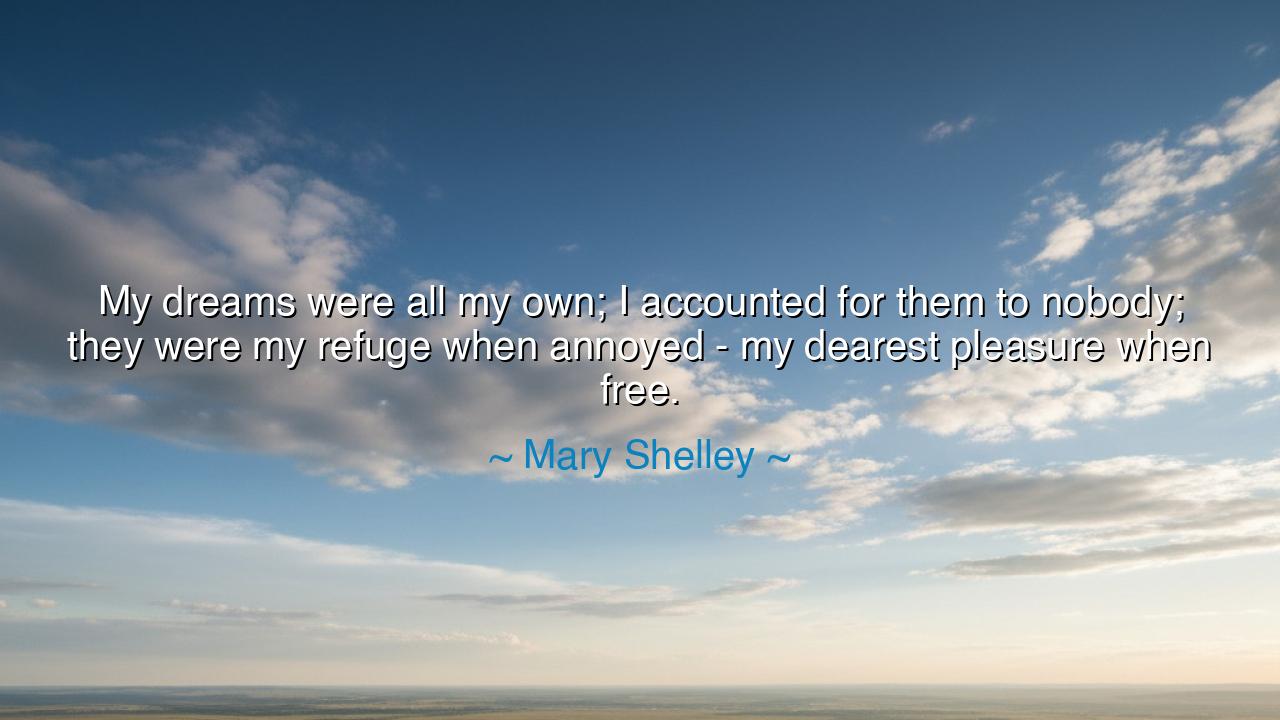
My dreams were all my own; I accounted for them to nobody; they
My dreams were all my own; I accounted for them to nobody; they were my refuge when annoyed - my dearest pleasure when free.






The words of Mary Shelley, the mother of Frankenstein, flow like a quiet river from the depths of the human heart: “My dreams were all my own; I accounted for them to nobody; they were my refuge when annoyed—my dearest pleasure when free.” In this utterance lies not only the confession of a soul, but a declaration of sacred independence—the cry of a spirit that found in dreams both sanctuary and sovereignty. In an age when women’s voices were often bound by custom and expectation, Shelley claimed dominion over the one realm that no hand could seize: the inner world of imagination.
In her dreams, Mary Shelley found freedom from the storm of her life. She knew loss before she knew peace—her mother, the fierce and brilliant Mary Wollstonecraft, died giving her life; her husband, the poet Percy Bysshe Shelley, would later vanish beneath the waves of the Mediterranean; her own youth was marked by exile, death, and the cold whisper of scandal. Yet through all this, she carried within her a lamp that could not be extinguished—the power of imagination. When she wrote Frankenstein, it was born not from the comforts of leisure, but from a vision—a dream that came to her one sleepless night, when lightning pierced the skies over Lake Geneva. That dream, born of terror and genius, became her refuge, her creation, her rebellion.
To live by one’s dreams is to live as one’s own master. The ancients knew this truth well. Marcus Aurelius, emperor and philosopher, wrote by candlelight amid war and decay, finding solace not in conquest, but in the quiet empire of thought. His reflections were his refuge, his way of ordering the chaos of existence. Likewise, Mary Shelley’s dreams were her fortress—her silent temple—where no judgment could follow, where no demand could intrude. There, she was both creator and god, shaping worlds from mist and memory.
But Shelley’s words hold more than comfort—they carry defiance. “I accounted for them to nobody,” she says, and in that proud solitude we hear the music of freedom. How many souls have bent their dreams to the will of others? How many have silenced their inner voice for fear of ridicule, or rejection, or the cold indifference of the world? Shelley teaches that the dreamer owes no apology for what blooms in the secret garden of the mind. The dream is not a debt to be explained—it is a birthright to be cherished.
Consider Vincent van Gogh, who painted his visions though the world called him mad. His dreams, too, were his refuge—his trembling brushstrokes his only prayer. He died in obscurity, yet his visions now illuminate the world. So it was with Shelley: her nocturnal imagination, once dismissed as gothic fancy, became the seed of modern science fiction, the mirror of humanity’s ambition and despair. Those who dare to keep their dreams untouched by the world’s noise are often misunderstood—but they are also the ones who leave footprints in eternity.
Thus, from this sacred quote arises a lesson for the heart: guard your inner world. In times of turmoil, let your dreams be your refuge; in times of peace, let them be your pleasure. Do not allow the voices of others to trample upon the fields of your imagination. To share one’s dream too soon is to hand it over to the winds. Nurture it first in silence, until it grows strong enough to stand against the storm.
And when life presses upon you—when duties, sorrows, or injustices threaten to drown your fire—retreat not into despair but into creation. Write, paint, sing, wander through the vast corridors of your own thought. There you will find not escape, but renewal. The dream is not an illusion—it is the soul’s secret workshop, where tomorrow’s truths are forged.
So remember, O seeker of meaning: the world may command your labor, your time, your body—but your dreams are your own. They are the final sanctuary of freedom, the quiet kingdom where your spirit reigns. Protect them, nourish them, and when you are strong, let them rise like dawn to warm the earth.






AAdministratorAdministrator
Welcome, honored guests. Please leave a comment, we will respond soon